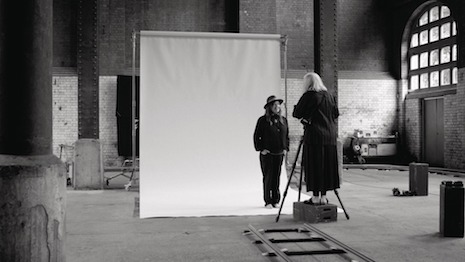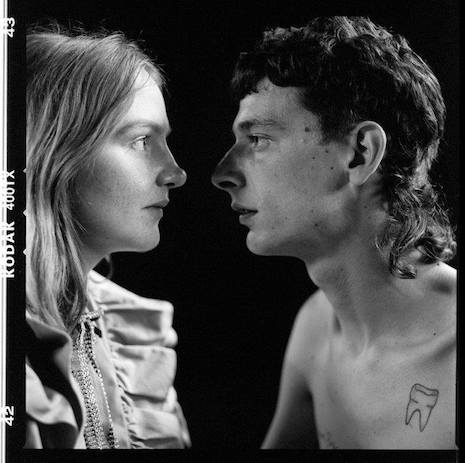 Miu Miu's "Brigitte" focuses on Brigitte Lacombe. Image credit: Miu Miu
Miu Miu's "Brigitte" focuses on Brigitte Lacombe. Image credit: Miu Miu
Prada-owned Miu Miu is telling a nonfiction story in its latest Women’s Tales film, as photographer Brigitte Lacombe steps in front of the camera.
The 18th commissioned film in Miu Miu's ongoing series, “Brigitte,” features both conversations with the photographer and footage of her at work capturing shots of subjects she is closely connected to. This documentary-style film is a departure for the typically fictional Women's Tales, taking the series' exploration of vanity and femininity into a different genre.
"Miu Miu’s aim with these Women’s Tales is to highlight the stories of all women," said Lauren Bates, marketing manager and lead storyteller at Blue Moon Digital, Denver, CO. "Not some women or most women. All women.
"These stories are about femininity, self-discovery, vanity and the exploration of what being a woman in the 21st century is like and how that is unique to each woman," she said. "So, what better subject to ask about self-discovery and vanity than a portrait photographer?
"Photographers are ever vigilant and can see or create a story through an image. Ms. Lacombe talks about how she relates to people through the lens, how being behind the camera allows her to connect and stay in the present. To form an intimate bond with the subject because photography is her way of seeing, her way of relating."
Ms. Bates is not affiliated with Miu Miu, but agreed to comment as an industry expert. Miu Miu was reached for comment.
Photography profiles
Ms. Lacombe is known for her portraiture. Among her subjects is Miu Miu’s creative director and founder Miuccia Prada, whom Ms. Lacombe has photographed multiple times.
The photographer has also been on-site during the filming of numerous Women’s Tales shorts to document the behind-the-scenes process through stills.
Brigitte director Lynne Ramsay, whose previous work includes “We Need to Talk About Kevin” and “You Were Never Really Here,” also posed for Ms. Lacombe. The process of watching the photographer work on her own portrait inspired Ms. Ramsay to want to explore Ms. Lacombe as an artist in documentary form.
At the start of he black-and-white Women's Tales short, an audio interview between Ms. Ramsay and Ms. Lacombe plays as a series of still photographs are shown. The two women talk about the casting, in which Ms. Ramsay pulled together a group of individuals who were both characters she would cast in one of her films and simultaneously meaningful to Ms. Lacombe.
In the next scene, a stark room in a hydraulic factory in London is suddenly turned into a photo studio, with a backdrop and equipment. The viewer watches from the vantage point of a subject as Ms. Lacombe stands behind a camera taking a series of photos.
Viewers get a further sense of the on-set experience as Ms. Lacombe instructs Ms. Ramsay to be both grounded and relaxed at the same time.
A voiceover from Ms. Lacombe further explains her views on portraiture, in which she does not want to direct, but rather collaborate with her subject.
Photograph taken by Brigitte Lacombe during the documentary filming. Image credit: Miu Miu
Among the other subjects that are captured in film is Ms. Lacombe’s sister Marian. Providing a fuller picture of Ms. Lacombe’s life and relationships, Marian discusses their childhood together as well as their friendship as adults.
Ms. Lacombe also discusses everything from her uniform wardrobe to deeper topics such as her lack of long-term romantic relationships. She explains that her sense of intimacy has translated over to her work.
The photographer also talks about how her medium is more about being present than technical knowledge.
Miu Miu Women's Tales #18 - Brigitte
"A common thread in this documentary, and in many of the other Women’s Tales stories, is relationships," Ms. Bates said. "In this documentary, the subjects – including Lacombe – talk about how meaningful relationships are. How they ebb and flow and change over time.
"I think that talking about relationships, especially those that women have with other women, is a necessary part of the storytelling that goes into these Women’s Tales," she said. "A woman’s connection to her network of women, to her lady tribe, is a vital part of every woman’s story, and you get to see a lot of those connections in this documentary, including when Ms. Lacombe talks about her relationships.
"In this film it talks about people wanting a connection – a deep connection – to be truly seen by another. I think that is also why they highlight female relationships.
"So, I think that is what Miu Miu is striving to do with these stories, let the viewer or potential customer know that they are seen. That there is a place and space for them with the brand. And it is really highlighted in this one in particular because it feels so literal since they are featuring a portrait photographer."
Film festival
Miu Miu's half hour-long film premiered at the Venice Film Festival on Sept. 1.
Along with Brigitte, the brand also screened its 17th edition, which examines war through a feminine lens.
“Shako Mako,” directed by Hailey Gates, tells the story of Laila, an aspiring actress who feels stuck as she plays a civilian role in a staged training program for U.S. troops. Through the story, the film explores themes as wide-ranging as Islamophobia and the theatrics of war, as well as the roles women play in both entertainment and real life (see story).
Since 2011, Miu Miu has been creating the Women’s Tales film series that focuses on various women in differing fields in artful and unique ways directed by women. The films span a variety of genres.
In 2014, the label created a new dedicated Instagram to extend the influence of the initiative. The @MiuMiuWomensTales Instagram account is devoted to past films as well as those to come (see story).
"Miu Miu has really shown their cinematic prowess and capability with the Women’s Tales stories," Ms. Bates said. "I think that they have set the bar very high for themselves, but I think that is fantastic.
"Film and fashion have always gone together, so this pairing makes sense," she said. "It makes sense that Miu Miu is inserting themselves into film to broaden their reach.
"Even outside of the fact that fashion and film make an excellent paring, more and more people are consuming video content. Content that is featured in video format is getting more engagement across social platforms and mediums. So, the better the content, the more engagement it will have, and having a premier at the Venice Film Festival attached to your video content isn't a bad spot to be in."
